The Sahara Blend is the reference name of the Algerian crude oil, which is produced on several Algerian oil fields.[ citation needed ]
Sahara Blend is a light crude, its extreme lightness and very low sulfur content makes it among the most popular with refineries for light derivatives such as gasoline and kerosene compared to Brent [1] and West Texas Intermediate (WTI). [2] [3]
The API gravity of the Sahara Blend is around 45° and a sulfur content of 0.05%. [4]
The Sahara Blend is listed on the London market, which is the benchmark for the Algerian barrel price.

Petroleum, also known as crude oil, or simply oil, is a naturally occurring yellowish-black liquid mixture of mainly hydrocarbons, and is found in geological formations. The name petroleum covers both naturally occurring unprocessed crude oil and petroleum products that consist of refined crude oil.

Fuel oil is any of various fractions obtained from the distillation of petroleum. Such oils include distillates and residues. Fuel oils include heavy fuel oil, marine fuel oil (MFO), furnace oil (FO), gas oil (gasoil), heating oils, diesel fuel, and others.

West Texas Intermediate (WTI) is a grade or mix of crude oil; the term is also used to refer to the spot price, the futures price, or assessed price for that oil. In colloquial usage, WTI usually refers to the WTI Crude Oil futures contract traded on the New York Mercantile Exchange (NYMEX). The WTI oil grade is also known as Texas light sweet. Oil produced from any location can be considered WTI if the oil meets the required qualifications. Spot and futures prices of WTI are used as a benchmark in oil pricing. This grade is described as light crude oil because of its low density and sweet because of its low sulfur content.
Sweet crude oil is a type of petroleum. The New York Mercantile Exchange designates petroleum with less than 0.5% sulfur as sweet.
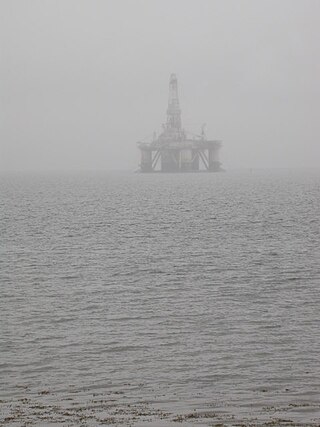
Brent Crude may refer to any or all of the components of the Brent Complex, a physically and financially traded oil market based around the North Sea of Northwest Europe; colloquially, Brent Crude usually refers to the price of the ICE Brent Crude Oil futures contract or the contract itself. The original Brent Crude referred to a trading classification of sweet light crude oil first extracted from the Brent oilfield in the North Sea in 1976. As production from the Brent oilfield declined to zero in 2021, crude oil blends from other oil fields have been added to the trade classification. The current Brent blend consists of crude oil produced from the Forties, Oseberg, Ekofisk, Troll oil fields and oil drilled from Midland, Texas in the Permian Basin.

Sonatrach is the national state-owned oil company of Algeria. Founded in 1963, it is known today to be the largest company in Africa with 154 subsidiaries, and often referred as the first African oil "major". In 2021, Sonatrach was the seventh largest gas company in the world.
Heavy crude oil is highly viscous oil that cannot easily flow from production wells under normal reservoir conditions.
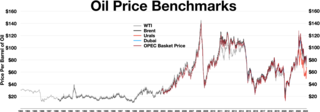
Dubai Crude is a medium sour crude oil extracted from Dubai. Dubai Crude is used as a price benchmark or oil marker because it is one of only a few Persian Gulf crude oils available immediately. There are two other main oil markers: Brent Crude and West Texas Intermediate.

In Amenas is a town and commune in eastern Algeria, bordering with Libya. The town is located 30 kilometres (19 mi) west of the border. There is no border crossing in the area. The municipality had 7,385 inhabitants in 2008, up from 5.302 in 1998, with an annual growth rate of 3.4% According to the Algerian novelist Mouloud Mammeri the name is a Tuareg word which means "place of camel drivers."
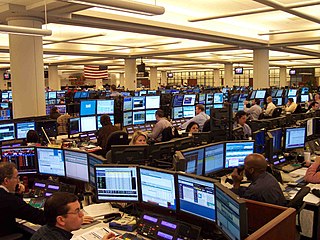
The price of oil, or the oil price, generally refers to the spot price of a barrel of benchmark crude oil—a reference price for buyers and sellers of crude oil such as West Texas Intermediate (WTI), Brent Crude, Dubai Crude, OPEC Reference Basket, Tapis crude, Bonny Light, Urals oil, Isthmus, and Western Canadian Select (WCS). Oil prices are determined by global supply and demand, rather than any country's domestic production level.

A benchmark crude or marker crude is a crude oil that serves as a reference price for buyers and sellers of crude oil. There are three primary benchmarks, West Texas Intermediate (WTI), Brent Blend, and Dubai Crude. Other well-known blends include the OPEC Reference Basket used by OPEC, Tapis Crude which is traded in Singapore, Western Canadian Select used in Canada, Bonny Light used in Nigeria, Urals oil used in Russia and Mexico's Isthmus. Energy Intelligence Group publishes a handbook which identified 195 major crude streams or blends in its 2011 edition.

The OPEC Reference Basket (ORB), also referred to as the OPEC Basket, is a weighted average of prices for petroleum blends produced by OPEC members. It is used as an important benchmark for crude oil prices. OPEC has often attempted to keep the price of the OPEC Basket between upper and lower limits, by increasing and decreasing production. This makes the measure important for market analysts. The OPEC Basket, including a mix of light and heavy crude oil products, is heavier than both Brent crude oil, and West Texas Intermediate crude oil.
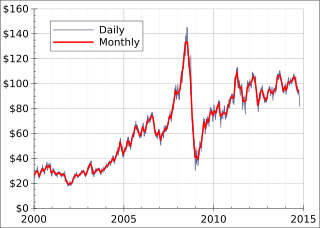
From the mid-1980s to September 2003, the inflation adjusted price of a barrel of crude oil on NYMEX was generally under $25/barrel. Then, during 2004, the price rose above $40, and then $60. A series of events led the price to exceed $60 by August 11, 2005, leading to a record-speed hike that reached $75 by the middle of 2006. Prices then dropped back to $60/barrel by the early part of 2007 before rising steeply again to $92/barrel by October 2007, and $99.29/barrel for December futures in New York on November 21, 2007. Throughout the first half of 2008, oil regularly reached record high prices. Prices on June 27, 2008, touched $141.71/barrel, for August delivery in the New York Mercantile Exchange, amid Libya's threat to cut output, and OPEC's president predicted prices may reach $170 by the Northern summer. The highest recorded price per barrel maximum of $147.02 was reached on July 11, 2008. After falling below $100 in the late summer of 2008, prices rose again in late September. On September 22, oil rose over $25 to $130 before settling again to $120.92, marking a record one-day gain of $16.37. Electronic crude oil trading was temporarily halted by NYMEX when the daily price rise limit of $10 was reached, but the limit was reset seconds later and trading resumed. By October 16, prices had fallen again to below $70, and on November 6 oil closed below $60. Then in 2009, prices went slightly higher, although not to the extent of the 2005–2007 crisis, exceeding $100 in 2011 and most of 2012. Since late 2013 the oil price has fallen below the $100 mark, plummeting below the $50 mark one year later.
Tapis crude is a Malaysian crude oil used as a pricing benchmark in Singapore. Tapis is very light, with an API gravity of 43°-45°, and very sweet, with only about 0.04% sulfur. While it is not traded on a market like Brent Crude or West Texas Intermediate (WTI), it is often used as an oil marker or price referencing indicator for Asia and Australia.
Western Canadian Select (WCS) is a heavy sour blend of crude oil that is one of North America's largest heavy crude oil streams and, historically, its cheapest. It was established in December 2004 as a new heavy oil stream by EnCana (now Cenovus), Canadian Natural Resources, Petro-Canada (now Suncor) and Talisman Energy (now Repsol Oil & Gas Canada). It is composed mostly of bitumen blended with sweet synthetic and condensate diluents and 21 existing streams of both conventional and unconventional Alberta heavy crude oils at the large Husky Midstream General Partnership terminal in Hardisty, Alberta. Western Canadian Select—the benchmark for heavy, acidic (TAN <1.1) crudes—is one of many petroleum products from the Western Canadian Sedimentary Basin oil sands. Calgary-based Husky Energy, now a subsidiary of Cenovus, had joined the initial four founders in 2015.
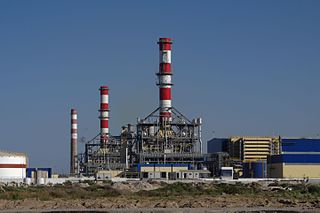
The energy sector in Tunisia includes all production, processing and, transit of energy consumption in this country. The production involves the upstream sector that includes general oil and gas, the downstream sector that includes the only refinery in Tunisia and most of the production of natural gas, and varied electrical/renewable energies. Renewable energy has been a strong point of focus for Tunisia as they look to optimize their green energy sources and advance their developing country. The Tunisian government has partnered with Russia and France in hopes of establishing nuclear energy as a viable alternative to fossil fuels and taking up a nontrivial chunk of the energy production in Tunisia. This is expected to be accomplished in the 2020s.

The 2019–2021 Algerian protests, also called Revolution of Smiles or Hirak Movement began on 16 February 2019, six days after Abdelaziz Bouteflika announced his candidacy for a fifth presidential term in a signed statement. These protests, without precedent since the Algerian Civil War, were peaceful and led the military to insist on Bouteflika's immediate resignation, which took place on 2 April 2019. By early May, a significant number of power-brokers close to the deposed administration, including the former president's younger brother Saïd, had been arrested.

On 8 March 2020, Saudi Arabia initiated a price war on oil with Russia, which facilitated a 65% quarterly fall in the price of oil. The price war was triggered by a break-up in dialogue between the Organization of the Petroleum Exporting Countries (OPEC) and Russia over proposed oil-production cuts in the midst of the COVID-19 pandemic. Russia walked out of the agreement, leading to the fall of the OPEC+ alliance.

Mohamed Arkab is an Algerian politician who is serving as Minister of Energy since 22 February 2021.